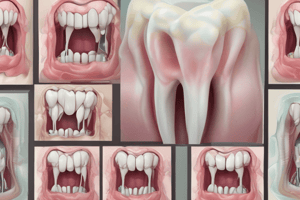Podcast
Questions and Answers
What are common signs of unhealthy gums?
What are common signs of unhealthy gums?
- Black spots, dryness, no pain, no bad breath
- Yellowing, sensitivity, tightness, no bad breath
- White spots, no swelling, no bleeding, fresh breath
- Redness, swelling, bleeding while brushing or flossing, bad breath (correct)
Which element is vital for preserving oral health?
Which element is vital for preserving oral health?
- Consuming sugary foods regularly
- Establishing a consistent oral care routine (correct)
- Brushing vigorously only once a day
- Using mouthwash after every meal
How often should you floss to remove plaque effectively?
How often should you floss to remove plaque effectively?
- Twice a day (correct)
- Only when you remember
- Once a week
- Three times a month
What is the recommended duration for brushing your teeth?
What is the recommended duration for brushing your teeth?
How should mouthwash be used in relation to brushing and flossing?
How should mouthwash be used in relation to brushing and flossing?
Why are regular dental check-ups and good oral hygiene habits crucial?
Why are regular dental check-ups and good oral hygiene habits crucial?
What is a key aspect of maintaining optimal oral health according to the text?
What is a key aspect of maintaining optimal oral health according to the text?
How does tooth decay occur according to the text?
How does tooth decay occur according to the text?
What is recommended to prevent tooth decay according to the text?
What is recommended to prevent tooth decay according to the text?
Why are gums important for maintaining oral health?
Why are gums important for maintaining oral health?
What is not included in dental hygiene practices according to the text?
What is not included in dental hygiene practices according to the text?
Which aspect of oral health involves preventing tooth decay and gum diseases?
Which aspect of oral health involves preventing tooth decay and gum diseases?
Flashcards are hidden until you start studying
Study Notes
Oral Health
Oral health refers to maintaining healthy teeth, gums, and the supporting structures that keep them in place. It involves preventing tooth decay, gum diseases, and other dental conditions through good oral hygiene practices and regular professional check-ups. Here are some key aspects of maintaining optimal oral health:
Dental Hygiene
Dental hygiene is crucial for maintaining oral health. This includes brushing your teeth at least twice daily with fluoride toothpaste, cleaning between your teeth once a day using an interdental brush or floss, and rinsing with mouthwash to help kill bacteria and freshen your breath. Oral health extends beyond just the basic smile; it also includes the health of the tongue, saliva, hard and soft palates, and the back of the throat (tonsils).
Tooth Decay
Tooth decay occurs when plaque builds up on the teeth and produces acid from sugars in food. This weakens the enamel covering on the tooth surface, eventually leading to cavities if not treated promptly. To prevent tooth decay:
- Brush regularly with a toothbrush that has a seal of approval by the American Dental Association.
- Use a fluoride toothpaste, which can strengthen the outer layer of teeth, making them more resistant to tooth decay.
- Avoid sugary foods and drinks, especially between meals.
Gum Health
Gums play an essential role in maintaining overall oral health. Optimal gum health means pink, firm, and healthy tissue surrounding each tooth. Signs of unhealthy gums include redness, swelling, bleeding while brushing or flossing, and bad breath. Regular dental visits and proper oral care routines can help maintain gum health.
Oral Care Routine
Establishing a consistent oral care routine is vital for preserving oral health throughout life. Key elements of this routine include:
Brushing
Brush gently for two minutes twice a day with a soft-bristle toothbrush.
Flossing
Floss daily to remove plaque from between your teeth and under the gum line, where your toothbrush may not reach.
Mouthwash
Mouthwashes can be used to supplement these steps, but they should not replace either brushing or flossing.
Diet
Limit sugar intake as much as possible, and consume nutritious foods that promote strong teeth and bones.
Oral Diseases
There are various types of oral diseases, including gum disease, Canker sores, and oral cancer. Regular dental check-ups and good oral hygiene habits are crucial for early detection and treatment of any potential problems. Common signs of oral diseases include persistent bad breath, painful chewing, loose teeth, or unusual lumps or bumps inside the mouth. Consult your dentist if you notice any such symptoms.
Studying That Suits You
Use AI to generate personalized quizzes and flashcards to suit your learning preferences.




